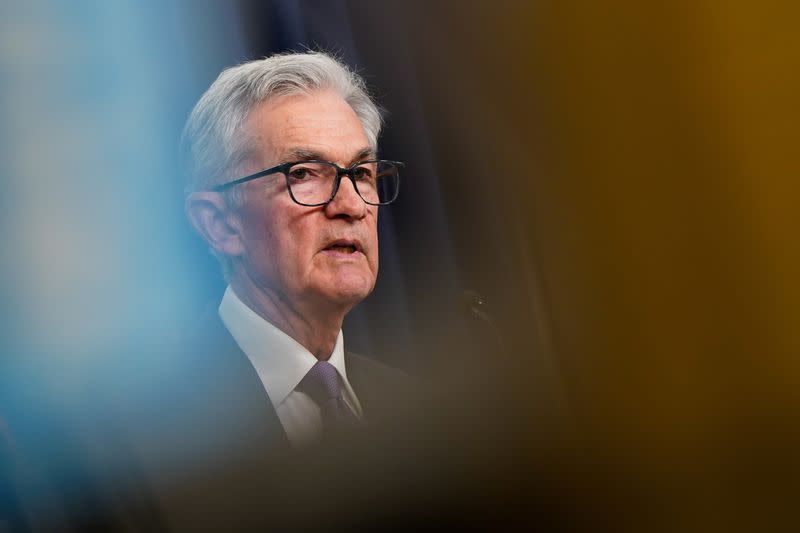Fed gets an earful about 'stranglehold' from high rates

By Ann Saphir
(Reuters) -Federal Reserve Chair Jerome Powell and fellow Fed governors on Friday heard firsthand from business and community leaders how the Fed's interest rate hikes, along with ongoing price and labor market pressures, are affecting Americans.
Higher interest rates together with instability in commodity prices "has a stranglehold on the American agriculturalist right now, which leads to a stranglehold on all of rural America," said Whitney Ferris-Hansen, who owns and operates J/W Farms and Ranch in Burlington, Colorado. "An increase in rates is always expected and planned for, but the speed at which these increases happened could not be risk-managed; we could not forward contract grain fast enough to hedge these interest rates."
Starting in March 2022 the Fed raised interest rates rapidly to fight decades-high inflation, bringing its short-term benchmark rate to the 5.25%-5.5% range where it has kept it since last July.
The "Fed Listens" event where Ferris-Hansen and five others spoke and answered policymakers' questions was the latest in a series begun before the pandemic and designed to give U.S. central bankers a close look at the real-world effects of their rate-setting decisions.
It took place at the same table where earlier this week policymakers decided to keep the benchmark short-term policy rate steady. After that meeting Powell said policymakers expect to cut interest rates later this year, but only once they have greater confidence that inflation is under control.
Friday's panel made clear that for some Americans, that time cannot come soon enough.
Rising borrowing costs coupled with higher energy and transportation prices as well as rising wages are squeezing profits for small and medium-sized manufacturers, said Cara Walton, director at Southfield, Michigan-based Harbour Results, a consulting firm for small manufacturers. Some have stopped investing in new equipment because they cannot afford the more expensive financing coupled with slowing demand, she said.
"The total cost to invest is very high, and the return on that investment is very long and getting longer," she said. Small manufacturing companies with young leaders "have never run a business with interest rates like this... it's uncharted territory for us."
Other panelists gave accounts of the impact of continuing pressures from higher prices, even as the rate of increase - inflation - has slowed under pressure of the Fed's interest-rate hikes.
"We're basically in the midst of a perfect storm," said Derrick Chubbs, president and CEO of Second Harvest Food Bank of Central Florida in Orlando, Florida, noting increased costs of healthcare, childcare, transportation and insurance, along with groceries and housing. His network of nonprofits currently distributes 300,000 meals daily, as much as at the height of the pandemic recession.
One reason for hope: Rents in Orlando are down for the first time since 2020, he said, attributing the decline to the Fed's rate hikes.
Policymakers seemed particularly keen to hear from Svenja Gudell, chief economist at job website Indeed, who noted signs of a cooling labor market compared with the "frenzied" 2021-2022 period, especially in higher-paid sectors like technology where job postings have fallen the most. Food service and other lower-wage jobs offering benefits like health insurance and time off rose sharply in 2021 and early 2022, she said, but growth has since slowed.
"Send us your slides," Powell said.
(Reporting by Ann Saphir; Editing by Andrea Ricci)
